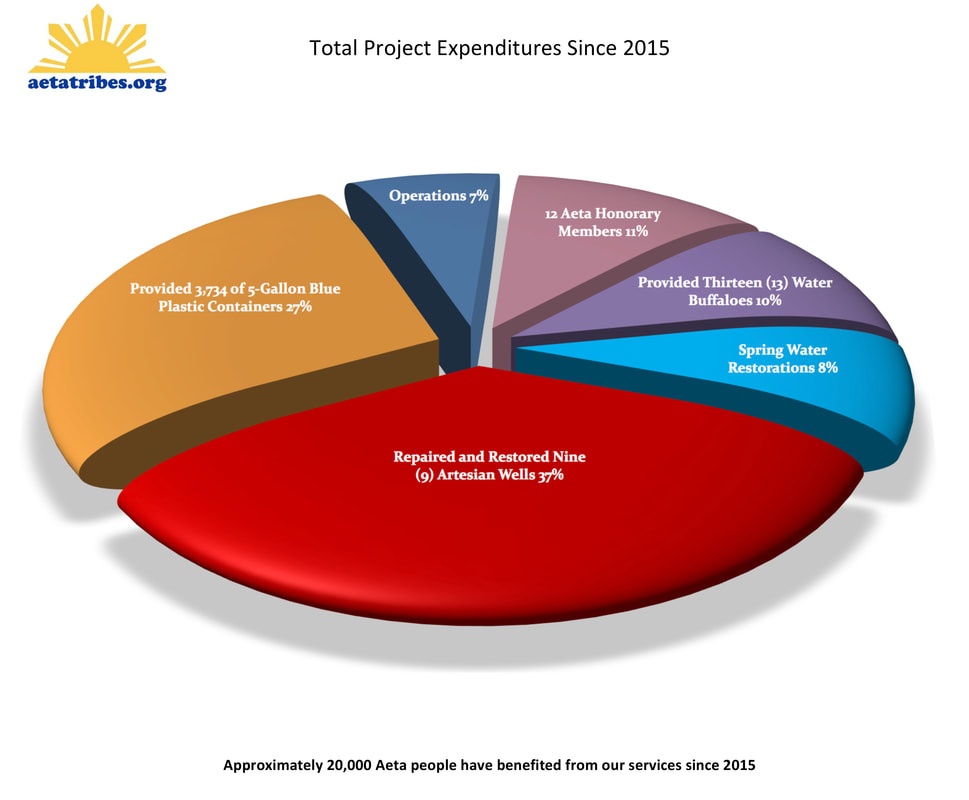Year-End Summary for 2023
We are very grateful and thankful for all our donors who have generously contributed year after year to make our success possible. We’ve made an impact only because of your continued support.
As our budget has dwindled down to $5,789 remaining for the year, it is time to end our books for 2023 and look ahead to acquiring more funding to continue our progress in 2024. In January, our opening balance was $51,812 and we received $23,522 from donors throughout the year, totaling $75,334. Year-to-date, our total program cost was $63,280 for health and development projects and reforestation projects (the Lifesaving Feeding Program was $35,765, water projects $22,015, and agricultural programs $5500), and our operational costs were $6,265 (including bank service charges, website subscriptions, festivals, and legal fees). We want to give a special thank-you to the Katz Foundation for granting us $35,838 in December of 2022 to implement the Lifesaving Feeding Program for all the students at four primary schools. We recently learned that the Katz Foundation would not be able to make a donation this year, and unfortunately, we therefore won’t be able to continue the Lifesaving Feeding Program in 2024.
Youth, Hunger, and Education
On January 9, the Aeta Tribe Foundation implemented the Lifesaving Feeding Program (LFP) to provide daily meals for 470 students enrolled in four primary schools: Alunan Elementary School, Pilien ES, Pisapungan ES, and Tarukan ES. As a result of the program’s success, in the new semester in September student enrollment increased to 796 students, roughly 68% more. Further, 65 students graduated from the primary schools – the highest number of graduates ever – and 44 of these went on to high school. Food was clearly the motivating factor for the enrollment increase. Before the LFP, the children were severely malnourished. They suffered from diarrheal diseases and sometimes fainted due to hunger. Parents perceived this fainting as normal and assumed that the children would be better once they had eaten their typical meal of rice and salt. The LFP provided proper nutrition to students, often for the first time in their lives. We’ve come a long way in just 11 months. In addition to the increase in enrollment, absenteeism and dropping out are no longer issues. Classrooms are full of students, and teachers now teach some classes outdoors to accommodate the increased enrollment. To this end we also provided portable whiteboards that schools could use for teaching both indoors and out. Today, the children are happy and healthy, and enjoying their life in school. Almost all of them have gained several pounds, and their body mass index (BMI) has consistently risen from 11 or 12 to the much healthier range of 15 to 18.
Environment and Climate Change
The eruption of Mount Pinatubo in June 1991 altered the environment and the topography surrounding the mountain, especially in the provinces of Tarlac, Zambales, and Pampanga. The destruction eliminated the water, animals, fish, and crops that the Aeta people had relied on for thousands of years. The Aeta Tribe Foundation sees reforestation as the key factor in bringing back the lifestyle, culture, and traditions of Aeta communities.
This year, we selected four communities where we built water systems and toilet facilities, and we provided agricultural tools, vegetable seeds, and livestock. We planted 200 coconut trees surrounding the water systems to prevent potential landslides during the monsoon season, and the livestock will contribute to restoring healthy arable soil. We have completed four water-catchment systems and three toilets, generally near the primary schools, to end open defecation and provide clean water not only for the schoolchildren but also for all the residents of the nine communities nearby, 1,724 families with 8,620 people in the villages of Sta. Juliana Barangay in Tarlac (Manalal, Banangit, Tarukan, Alunan, Taliktik, Duray, Malalabatay, Pilien, and Pisapungan). We distributed a total of 2,850 five-gallon blue plastic containers to families, classrooms, and barangay-leadership meeting rooms. The schools have added agricultural classes for the children to learn how to grow food and to take care of domestic animals that will breed and be distributed among the communities through a raffle system. We helped start the program by providing agricultural tools and year-round vegetable seeds that can produce seedlings such as bitter melons, string beans, squash, eggplants, okra, peppers, ginger, and root crops. For livestock, we provided 5 water buffaloes, 8 pigs, 24 chickens, and 2 goats. Today, many of the homes have gardens in the yard to supplement food supplies and ensure that children continue to have food on weekends and after school.
While we prioritized villages in the Sta. Juliana area, we also initiated projects in other provinces. In Pampanga province we built a water system, handwashing station, and toilet facilities for children at Mawacat Elementary School in Floridablanca. The school has 360 students, and we hope to add an agricultural class in 2024. About an hour away from Mawacat, we met with the Aeta community of Diaz in Porac and distributed 250 water containers to the families there. We are still determining how we can help them in 2024. In Zambales province, we are currently repairing an old water system for Cabatuan village. In March, we distributed 300 five-gallon blue plastic containers there for each family, and we raised funds to assist them.
As 2023 draws to a close, we know that you have the choice to support a variety of nonprofit and charitable organizations that are close to your heart. We hope you will continue to support the successful work of the Aeta Tribe Foundation, and possibly increase your donation to help us reach $40,000 of donated funds in 2024 to help three Aeta communities receive the clean water, toilet facilities, and agricultural tools, seeds, and livestock – as we successfully provided to the villages of Alunan, Pilien, Pisapungan, and Tarukan in 2023. We hope to continue saving lives and giving hope to malnourished Aeta children who deserve a better future. We’re excited for another bright new chapter in the coming year!
In 2021, we supported four Aeta communities with a total of 1,180 families during the height of COVID-19 infections.
In 2022, we supported seventeen smaller Aeta communities with a total of 2,000 families.
This 2023, we supported eleven Aeta communities with a total of 2,217 families and 1,156 students enrolled in elementary schools.
We have taken several meaningful steps already, but with your help we can do even more. We are a 501 (c)(3) nonprofit organization, and your donation is tax-deductible. Our Federal Tax Identification number is 47-3714375. The Aeta Tribe Foundation does not have employees – all officers and board members are unpaid volunteers who provide in-kind donations of their time.
Please make your donations today by visiting our website https://www.aetatribes.org, or simply send your donation check payable to Aeta Tribe Foundation. We also hope you can follow us on Facebook at https://www.facebook.com/aetatribes.
Should you need additional information, please contact me at (415) 971-1227 or via email at [email protected].
Sincerely,
Fernando Briosos
Chairman
AETA TRIBE FOUNDATION * P.O. Box 14037 * San Francisco, CA 94114
As our budget has dwindled down to $5,789 remaining for the year, it is time to end our books for 2023 and look ahead to acquiring more funding to continue our progress in 2024. In January, our opening balance was $51,812 and we received $23,522 from donors throughout the year, totaling $75,334. Year-to-date, our total program cost was $63,280 for health and development projects and reforestation projects (the Lifesaving Feeding Program was $35,765, water projects $22,015, and agricultural programs $5500), and our operational costs were $6,265 (including bank service charges, website subscriptions, festivals, and legal fees). We want to give a special thank-you to the Katz Foundation for granting us $35,838 in December of 2022 to implement the Lifesaving Feeding Program for all the students at four primary schools. We recently learned that the Katz Foundation would not be able to make a donation this year, and unfortunately, we therefore won’t be able to continue the Lifesaving Feeding Program in 2024.
Youth, Hunger, and Education
On January 9, the Aeta Tribe Foundation implemented the Lifesaving Feeding Program (LFP) to provide daily meals for 470 students enrolled in four primary schools: Alunan Elementary School, Pilien ES, Pisapungan ES, and Tarukan ES. As a result of the program’s success, in the new semester in September student enrollment increased to 796 students, roughly 68% more. Further, 65 students graduated from the primary schools – the highest number of graduates ever – and 44 of these went on to high school. Food was clearly the motivating factor for the enrollment increase. Before the LFP, the children were severely malnourished. They suffered from diarrheal diseases and sometimes fainted due to hunger. Parents perceived this fainting as normal and assumed that the children would be better once they had eaten their typical meal of rice and salt. The LFP provided proper nutrition to students, often for the first time in their lives. We’ve come a long way in just 11 months. In addition to the increase in enrollment, absenteeism and dropping out are no longer issues. Classrooms are full of students, and teachers now teach some classes outdoors to accommodate the increased enrollment. To this end we also provided portable whiteboards that schools could use for teaching both indoors and out. Today, the children are happy and healthy, and enjoying their life in school. Almost all of them have gained several pounds, and their body mass index (BMI) has consistently risen from 11 or 12 to the much healthier range of 15 to 18.
Environment and Climate Change
The eruption of Mount Pinatubo in June 1991 altered the environment and the topography surrounding the mountain, especially in the provinces of Tarlac, Zambales, and Pampanga. The destruction eliminated the water, animals, fish, and crops that the Aeta people had relied on for thousands of years. The Aeta Tribe Foundation sees reforestation as the key factor in bringing back the lifestyle, culture, and traditions of Aeta communities.
This year, we selected four communities where we built water systems and toilet facilities, and we provided agricultural tools, vegetable seeds, and livestock. We planted 200 coconut trees surrounding the water systems to prevent potential landslides during the monsoon season, and the livestock will contribute to restoring healthy arable soil. We have completed four water-catchment systems and three toilets, generally near the primary schools, to end open defecation and provide clean water not only for the schoolchildren but also for all the residents of the nine communities nearby, 1,724 families with 8,620 people in the villages of Sta. Juliana Barangay in Tarlac (Manalal, Banangit, Tarukan, Alunan, Taliktik, Duray, Malalabatay, Pilien, and Pisapungan). We distributed a total of 2,850 five-gallon blue plastic containers to families, classrooms, and barangay-leadership meeting rooms. The schools have added agricultural classes for the children to learn how to grow food and to take care of domestic animals that will breed and be distributed among the communities through a raffle system. We helped start the program by providing agricultural tools and year-round vegetable seeds that can produce seedlings such as bitter melons, string beans, squash, eggplants, okra, peppers, ginger, and root crops. For livestock, we provided 5 water buffaloes, 8 pigs, 24 chickens, and 2 goats. Today, many of the homes have gardens in the yard to supplement food supplies and ensure that children continue to have food on weekends and after school.
While we prioritized villages in the Sta. Juliana area, we also initiated projects in other provinces. In Pampanga province we built a water system, handwashing station, and toilet facilities for children at Mawacat Elementary School in Floridablanca. The school has 360 students, and we hope to add an agricultural class in 2024. About an hour away from Mawacat, we met with the Aeta community of Diaz in Porac and distributed 250 water containers to the families there. We are still determining how we can help them in 2024. In Zambales province, we are currently repairing an old water system for Cabatuan village. In March, we distributed 300 five-gallon blue plastic containers there for each family, and we raised funds to assist them.
As 2023 draws to a close, we know that you have the choice to support a variety of nonprofit and charitable organizations that are close to your heart. We hope you will continue to support the successful work of the Aeta Tribe Foundation, and possibly increase your donation to help us reach $40,000 of donated funds in 2024 to help three Aeta communities receive the clean water, toilet facilities, and agricultural tools, seeds, and livestock – as we successfully provided to the villages of Alunan, Pilien, Pisapungan, and Tarukan in 2023. We hope to continue saving lives and giving hope to malnourished Aeta children who deserve a better future. We’re excited for another bright new chapter in the coming year!
In 2021, we supported four Aeta communities with a total of 1,180 families during the height of COVID-19 infections.
In 2022, we supported seventeen smaller Aeta communities with a total of 2,000 families.
This 2023, we supported eleven Aeta communities with a total of 2,217 families and 1,156 students enrolled in elementary schools.
We have taken several meaningful steps already, but with your help we can do even more. We are a 501 (c)(3) nonprofit organization, and your donation is tax-deductible. Our Federal Tax Identification number is 47-3714375. The Aeta Tribe Foundation does not have employees – all officers and board members are unpaid volunteers who provide in-kind donations of their time.
Please make your donations today by visiting our website https://www.aetatribes.org, or simply send your donation check payable to Aeta Tribe Foundation. We also hope you can follow us on Facebook at https://www.facebook.com/aetatribes.
Should you need additional information, please contact me at (415) 971-1227 or via email at [email protected].
Sincerely,
Fernando Briosos
Chairman
AETA TRIBE FOUNDATION * P.O. Box 14037 * San Francisco, CA 94114
QUARTERLY REPORT
February 2015
June 2015
September 2015
December 2015
January 2016
March 2016
June 2016
September 2016
December 2016
January 2017
March 2017
June 2017
September 2017
December 2017
January 2018
March 2018
June 2018
September 2018
December 2018
April 2019
October 2019
December 2019
October 2020
January 2021
January 2022
December 2022
December 2023
June 2015
September 2015
December 2015
January 2016
March 2016
June 2016
September 2016
December 2016
January 2017
March 2017
June 2017
September 2017
December 2017
January 2018
March 2018
June 2018
September 2018
December 2018
April 2019
October 2019
December 2019
October 2020
January 2021
January 2022
December 2022
December 2023


